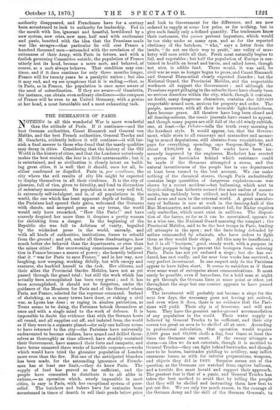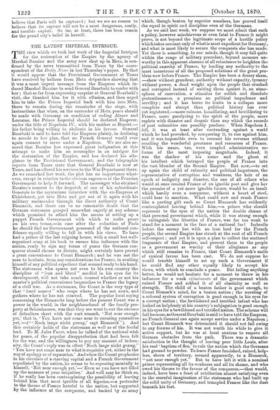THE DEMEANOUR OF PARIS.
-NOTHING in all this wonderful War is more wonderful than the attitude of Paris. If it continues—and the best German authorities, Count Bismarck and General von Moltke, and the best French authorities, General Trochu and M. Gambetta, evidently believe it will continue—it will fur- nish a final answer to those who dread that the manly qualities array decay in cities. Considering that the history of the Old World is the history of cities, and that the Londoner notoriously makes the best recruit, the fear is a little unreasonable ; but it is entertained, and as civilization is clearly intent on build- ing great cities, it is well that it should, once for all, be either confirmed or dispelled. Paris is, par excellence, the city where the evil results of city life might be expected to display themselves in all their virulence. It is the city of pleasure, full of vice, given to frivolity, and fond to distraction -of sedentary amusement. Its population is not very well fed, is extremely self-indulgent, and is, of all populations in the world, the one which has least apparent depth of feeling. If the Parisians had opened their gates, welcomed the Germans with shouts, and accepted peace on any terms, the world would only have remarked, "How like Paris !" and have scarcely despised her more than it despises a pretty woman for shrinking from a danger. In the beginning of the Republic she was full to delirium of vanity, beguiled by the wickedest press in the world, unready, and with all kinds of authorities, institutions, forces to rebuild -from the ground ; and yet, under all these disadvantages, how much better she behaved than the departments, or even than the minor cities ! Her overweening consciousness of her posi- tion in France became a source of power ; she heartily believed that it "was for Paris to save France," and in her way, now 'laughing, now weeping, working fitfully, but with energy and resource, she buckled herself to the task. Her citizens,, and their allies the Provincial Gardes Mobiles, have not as yet passed through the grand trial ; but still the work which has actually been accomplished has been very great ; and it has been accomplished, it should not be forgotten, under the .guidance of the Members for Paris and of the General whom Paris, not France, selected for the supreme command. Instead -of shrinking, as so many towns have done', or risking a civil war, as Lyons has done ; or raging in. aimless patriotism, as Tours seems to be doing, the Parisians betook themselves at -once and with a single mind to the work of defence. It is impossible to doubt the evidence that with the German hosts all round, and all supplies cut off, and isolated from the world -as if they were in a separate planet—for only one balloon seems -to have returned to the city—the Parisians have universally endeavoured to become soldiers, have armed and drilled them- selves as thoroughly as time allowed, have steadily sustained their Government, have manned their forts and ramparts, and 'have borne unmoved three weeks of horrible suspense,—weeks which would have tried the gloomier population of London more even than the fire. Not one of the anticipated blunders has been made, for the astounding ignorance of French- men has at least one limit,—they do know Paris. The supply of food has proved so far sufficient, and the people have consented to distribute it to all alike in rations,— an operation which, nearly impossible in most cities, is easy in Paris, with her exceptional system of poor- relief. The butchers and bakers have for centuries been accustomed in times of dearth to sell their goods below price
and look to Government for the difference, and are now ordered to supply at some low price, or for nothing, but to give each family only a defined quantity. The tradesmen know their customers, the queues prevent imposture, which would be too risky under so many eyes, and as for the reported obstinacy of the butchers, "who," says a letter from the inside, "do not see their way to profit," one volley of mus- ketry will soon settle all that. Fresh meat naturally begins to fail, and vegetables ; but half the population of Europe is sus- tained in health on bread and bacon, and salted horse, though not nice, is edible food. There would, it was said, be civil war as soon as hunger began to press, and Count Bismarck and General Blumenthal clearly expected disorder ; but the National Guard, the Provincial Mobiles, and the respectable workmen all support the Government ; and although the Prussians report pillaging in the suburbs there have clearly been no serious disorders within the city, which, though it contains, no doubt, many dangerous characters, contains also 320,000 respectable armed men, anxious for property and order. The people, moreover, with all their incurable light-heartedness, have become grave. All theatres have long been closed and all dancing-saloons, the comic journals have ceased to appear, and though many papers are still full of the old windy rubbish, one, at least—the De'bats—tells the truth every morning in the harshest style. It would appear, too, that the Govern- ment, while stern to all runaways and marauders and menac- ing to armed deputations, still abstains from requisitions, and pays for everything, spending, says Surgeon-Major Wyatt,
about £100,000 a day. The works have been im- mensely improved by the engineers, Rochefort has erected a system of barricades behind which resistance could be made if the Germans attempted a storm, and the natural inventiveness of the people has in one department at least been turned to the best account. We can make nothing of the chemical stories, though Paris undoubtedly contains large quantities of dangerous explosives—as was shown by a recent accident—but ballooning, which next to bicycle-riding has hitherto seemed the most useless of amuse- ments, has suddenly been utilized, and has enabled Paris to send news and men to the external world. A great manufac- tory of balloons is now at work in the dancing-hall of the Rue Montmartre, and materials cannot fail, for Nadar requires only umbrellas, which must exist in millions. The disposi- tion of the forces, so far as it can be ascertained, appears to be a wise one, the National Guard manning the rampart ; the Provincial Mobiles, said to be the best troops in Paris, leading all attempts in the open ; and the forts being defended by sailors commanded by admirals, who have orders to fight them as they would their ships. All this may be insufficient ; but it is all "business," good, steady work, with a purpose in it, that purpose being to prevent the besiegers from entering Paris. Paris has not yet endured a siege ; but she has en- dured, has met coolly, and for near four weeks has survived, a very perfect investment. In one respect only do the Parisians appear to have fallen short. It seems to outsiders as if there were some want of enterprise about communications. It must surely be possible, even if hazardous, for a bold man at night to get throne]. the German lines at some point or other, yet throughout the siege but one courier appears to have passed through.
The investment will probably not become a siege for the next few days, the necessary guns not having yet arrived, and even when it does, there is no evidence that the Pari- sians will yield. Their city is of freestone, and will not burn. They have the greatest under-ground accommodation of any population in the world. Their water supply is believed by General Trochu to be sufficient, and their city covers too great an area to be shelled all at once. According to professional calculation, that operation would require 2,000 guns and 60,000 shells a day, four times at least the force the Germans can exert. If the enemy attempts a storm—an idea we do not entertain, though it is ascribed to General Trochu—they can fight behind barricades, and though sure to be beaten, barricades yielding to artillery, may inflict enormous losses, as with far inferior preparations, weapons, and objects they did in 1849. Surprise seems out of the question, as the Germans are watched from captive balloons, and a terrible fire must herald and support their approach. The greatest fear is that of a panic, and General Trochu has taken the best method to avoid that by telling the people that they will be shelled and instructing them how best to put out fire. We see only too much reason, in the courage of The German Army and the skill of the German Generals, to believe that Paris will be captured ; but we see no reason to believe that its capture will not be a most dangerous, costly, and terrible exploit. So far, at least, there has been reason for the proud city's belief in herself.































 Previous page
Previous page